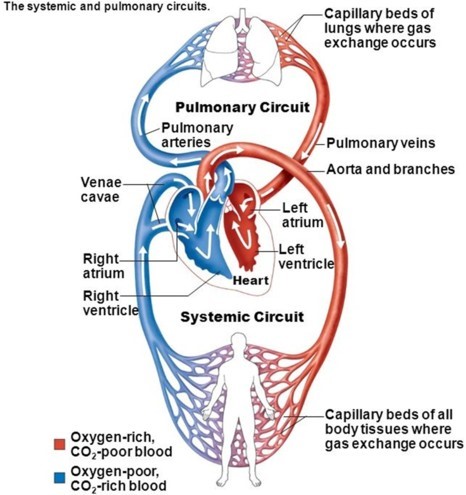Target cells for releasing hormones are in the:
Anterior pituitary gland.
Hypothalamus.
Thyroid gland.
Posterior pituitary gland.
The Correct Answer is B
The hypothalamus is the part of the brain that produces hormones that control the pituitary gland.
The pituitary gland then releases hormones that target other endocrine glands, such as the thyroid, adrenal, and gonads.
Therefore, the hypothalamus is the source of releasing hormones for target cells in the anterior pituitary gland.
Choice A is wrong because the anterior pituitary gland does not produce releasing hormones, but responds to them by secreting other hormones.
Choice C is wrong because the thyroid gland does not produce releasing hormones, but responds to them by secreting thyroid hormones.
Choice D is wrong because the posterior pituitary gland does not produce releasing hormones, but stores and releases hormones made by the hypothalamus, such as oxytocin and antidiuretic hormone.
Nursing Test Bank
Naxlex Comprehensive Predictor Exams
Related Questions
Correct Answer is D
Explanation
The systemic circuit sends oxygen-rich blood to the tissues.

It is part of the circulatory system that carries blood away from the heart, delivers it to most of the organs and tissues, and returns it to the heart again.
Choice A is wrong because it describes the pulmonary circuit, which brings oxygen-poor blood from the heart to the lungs.
Choice B is wrong because it is the opposite of what the systemic circuit does.
The systemic circuit brings oxygen-rich blood from the heart to the tissues, not from the tissues.
Choice C is wrong because it is also the opposite of what the systemic circuit does. The systemic circuit sends oxygen-poor blood to the heart, not from the heart.
Correct Answer is B
Explanation
Naturally acquired active immunity is the type of resistance that is acquired as a result of developing a disease.
This means that the immune system produces antibodies to fight off the infection and remembers the pathogen for future protection.
This type of immunity is long-lasting and sometimes life-long.
Choice A is wrong because naturally acquired passive immunity is the type of resistance that is acquired when a person receives antibodies from another source, such as from the mother through the placenta or breast milk.
This type of immunity is temporary and lasts only for a few weeks or months.
Choice C is wrong because artificially acquired active immunity is the type of resistance that is acquired when a person receives a vaccine that contains a weakened or killed form of the disease organism.
This triggers the immune system to produce antibodies and memory cells without causing the actual disease.
This type of immunity can last for years or decades, depending on the vaccine.
Choice D is wrong because artificially acquired passive immunity is the type of resistance that is acquired when a person receives antibody-containing blood products, such as immune globulin, that provide immediate protection from a specific disease.
This type of immunity is also temporary and lasts only for a few weeks or months.
Whether you are a student looking to ace your exams or a practicing nurse seeking to enhance your expertise , our nursing education contents will empower you with the confidence and competence to make a difference in the lives of patients and become a respected leader in the healthcare field.
Visit Naxlex, invest in your future and unlock endless possibilities with our unparalleled nursing education contents today
Report Wrong Answer on the Current Question
Do you disagree with the answer? If yes, what is your expected answer? Explain.
Kindly be descriptive with the issue you are facing.
